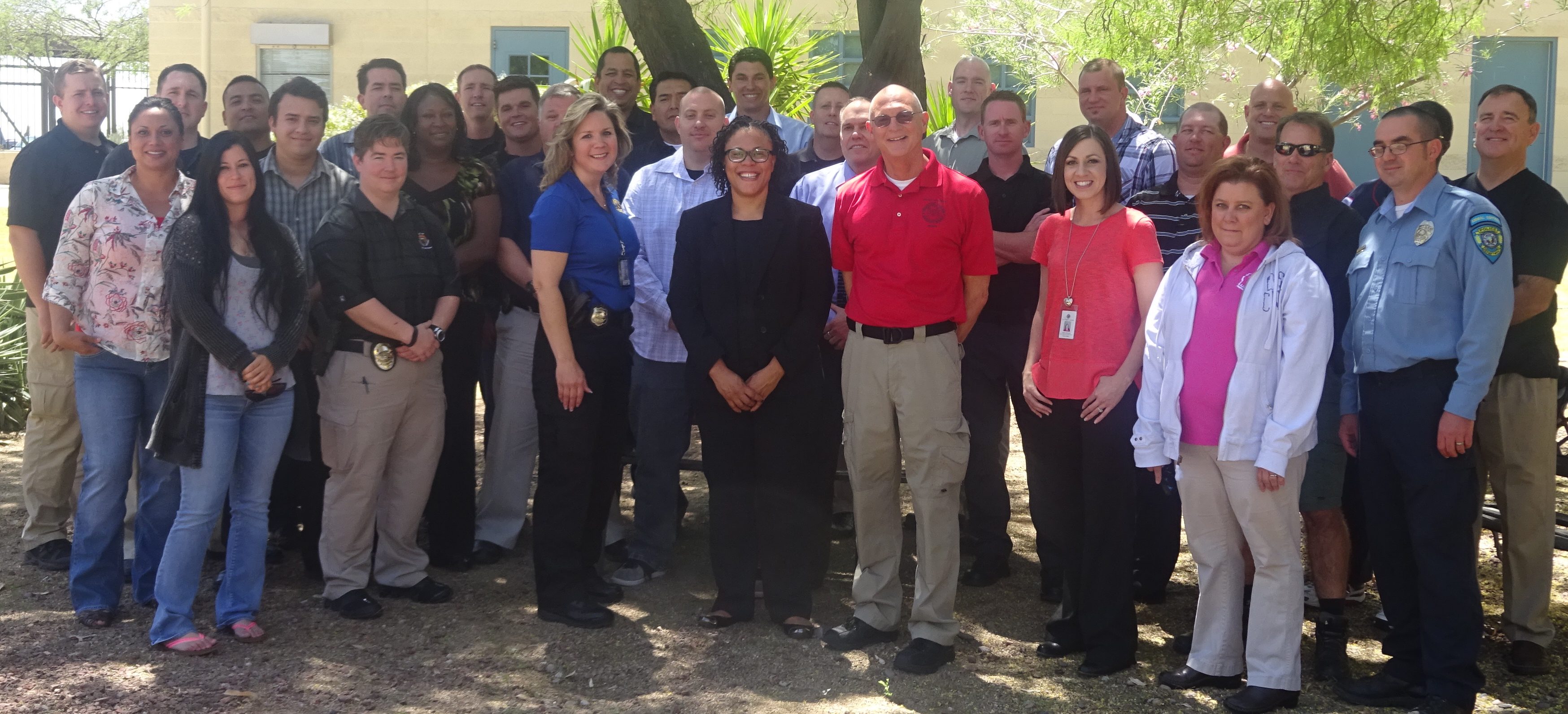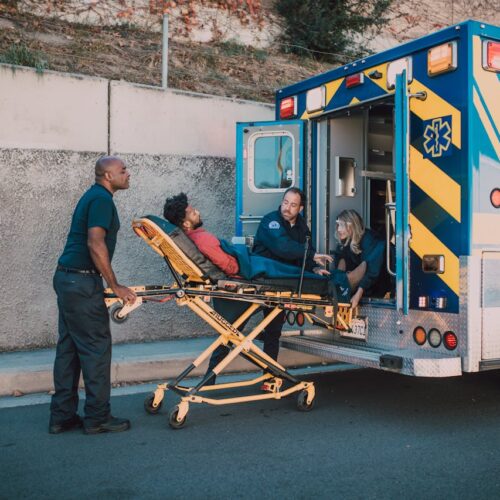Houston PD Crisis Intervention Training Comes to Apache Junction, Arizona

From left to right, Officer Rebecca Skillern (center, blue shirt), Nicola Smith-Kea of the CSG Justice Center, and Senior Officer Frank Webb stand with the Apache Junction CIT class.
The official city seal of Apache Junction, Arizona, shows a lone saguaro cactus standing tall amid a spare, rocky landscape; in the distance, mountains rise into a constant blue sky, dropping their shadows back down onto the desert. It’s an accurate depiction of the environment of this small city a half hour east of Phoenix, whose year-round population of 35,000 just about doubles in the winter, when Canadian and Midwestern “snowbirds” descend, seeking sun and warmth.
These winter visitors had largely returned north by mid-April, though, when Apache Junction welcomed two guests from a similar latitude. Officer Rebecca Skillern and Senior Officer Frank Webb, both of the Houston Police Department, were in town to teach a crisis intervention training (CIT) course to local first responders—police officers, paramedics and EMTs, dispatchers, and mental health professionals from Apache Junction and other nearby jurisdictions. For five days these men and women listened to Skillern and Webb explain different kinds of mental disorders, their causes and symptoms, how they might present, and how best to deal with people who have them.
Skillern and Webb are mental health training officers with Houston’s CIT program, which, like other CIT programs around the country, endeavors to improve the outcomes of interactions between law enforcement and people with mental disorders. Since 2007, the Houston Police Department has trained every one of its new cadets in CIT, and in 2010, the department was selected by the Council of State Governments Justice Center and the Bureau of Justice Assistance as a law enforcement and mental health learning site, not only because of its ability to give CIT instruction and advice to its own officers, but because of its willingness to train officers in other jurisdictions, too.
That willingness to travel and teach is why Skillern was standing at the front of a classroom in Apache Junction, lecturing about how to react on a call to a person threatening to commit suicide.
“As they’re talking about reasons for wanting to die, they’re often giving you reasons for wanting to live,” Skillern told the class. “So you need to listen to what they’re saying, and then you need to help them identify reasons for living.”
Skillern is a licensed professional counselor. Her plan, she said, had been to join the police department, stay a while, and then start her own counseling practice focused on law enforcement. Instead, she became one of Houston’s original Crisis Intervention Response Team (CIRT) officers—that is, a CIT-certified officer who responds to calls alongside a clinician from the Mental Health and Mental Retardation Authority of Harris County (Houston). Usually, the CIRT officer and clinician respond together to the most serious calls that involve a person experiencing a mental health crisis. No longer an active CIRT officer, Skillern now teaches CIT full-time.
Her CIT teaching partner, Frank Webb, has worked for the Houston Police Department for more than 35 years and was instrumental in starting its CIT program. He became the department’s first CIT coordinator in 2001 and held the position until 2006.
“Think of this training as another set of skills to add to your toolkit,” Webb told the class. “These techniques truly are applicable to a variety of groups and situations, and when you encounter a situation, then you have options—you can decide which tool to use.” Webb emphasized that nothing about CIT asks an officer to compromise his or her safety. “We’re just asking that you think about different ways of dealing with different situations.”
One might assume that a group of seasoned first responders—many of whom have spent years heading to calls and developing their own techniques for handling cases—might be resistant or even frankly hostile to the notion that a less-rigid, less-demanding, less-authoritative approach is actually sometimes a smarter one (as Webb put it, “Cops aren’t used to not having their orders followed.”). But this wasn’t the case in Apache Junction, where the audience appeared mostly interested in and receptive to CIT. This engagement was evident in the classroom, but it was most evident during the role-play exercises, which took place Thursday afternoon.
The role-play session of a CIT course is in many ways its culmination, the time when students are asked to apply the information they’ve learned in the preceding days. Skillern and Webb set up scenarios in which actors depict people undergoing mental health crises, and CIT students, in pairs, enter the scenarios and attempt to deescalate and resolve them.
At the Apache Junction training, Skillern and Webb arranged four such scenarios, located in different classrooms, and students entering them were given little initial information about the particular circumstances. In one scenario, for instance, a man has doused himself with gasoline, is holding a lighter, and is claiming he no longer wants to live; in another, a person gripping a metal rod paces aimlessly around a pile of plywood, seemingly distracted and muttering to himself. Each interaction lasted four minutes, after which time an observer ended the exercise and then gave the two students feedback on their performance.
In Apache Junction, that feedback was mostly positive; the teams largely handled the situations with patience, consideration, and skill. After calmly and casually questioning the man pacing about the plywood pile, for example, Apache Junction Police Officer Joshua DuPont quickly ascertained his name and determined that he was having a psychotic episode, hearing a voice that was telling him to do harmful things. “Are you taking any medicine, Randy?” DuPont asked the man. Randy replied that he’d taken medicine once, long ago, but that it’d made him feel sick to his stomach.
“You know, Randy, they have new medications now,” DuPont said, repeating something Skillern had mentioned in class the day before. “It’s possible that there’s one that won’t make you feel sick.”
DuPont kept up the friendly conversation, and an initially tense situation eased; eventually, Randy agreed to accompany the two officers to get the help he needed.
“Great job,” said Webb, who’d been observing the interaction. He reviewed his notes with the two officers, pointing out what the pair had done well (almost everything) and the few instances where they might’ve taken a different approach (“I would’ve kept a greater distance, at least at first.”).
“I thought they did a really good job. Really nice.” Webb said after the officers left the room. Then he flipped his notepad to a blank page and prepared for the next group.
The Houston Police Department–led CIT course in Apache Junction was facilitated by the CSG Justice Center. Click here to learn more about how the Justice Center supports this work.
In response to growing calls for police reform in New Jersey, particularly following the shootings of Najee Seabrooks…
Read More Three Things to Know About New Jersey’s Groundbreaking Community Response Legislation
Three Things to Know About New Jersey’s Groundbreaking Community Response Legislation
In response to growing calls for police reform in New Jersey, particularly…
Read More Apply Now: Join a Learning Community for Community and Crisis Response Teams to Improve Responses to Youth
Read More
Apply Now: Join a Learning Community for Community and Crisis Response Teams to Improve Responses to Youth
Read More
 Apply Now: Join a Learning Community Focused on Substance Use and Overdose Community Response Programs
Read More
Apply Now: Join a Learning Community Focused on Substance Use and Overdose Community Response Programs
Read More













